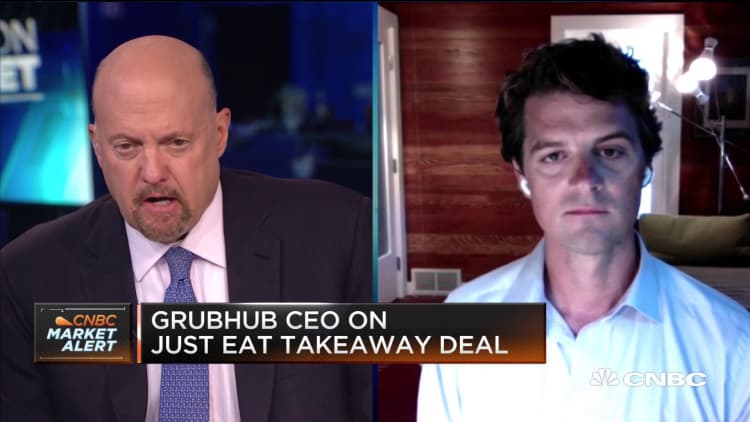Taco Bell owner Yum Brands is suing Grubhub, claiming that it violated its distribution agreement.
Yum bought a 3% stake in the third-party delivery app in 2018 as more national chains looked to lift sales by offering delivery. As part of the deal, the two signed a contract that required the delivery app to give Yum favorable pricing and service levels for thousands of Taco Bell and KFC restaurants, which are largely operated by franchisees.
The lawsuit, filed Thursday in New York County's Supreme Court, alleges that Grubhub CEO Matt Maloney improperly terminated the company's contract with Yum on June 2. He sent the company a letter claiming that Yum's work with Uber Eats and Postmates violated the terms of the deal. Yum denies the allegation.
Yum said that it demanded that Grubhub revoke its termination of the contract and enter into negotiations. But Grubhub instead reached out to franchisees directly on Monday imposing a new pricing structure, according to the suit.

The new fees will mean that consumers will have to pay nearly 40% more for Grubhub deliveries of food from Yum's restaurants.
The lawsuit also claims that Grubhub showed signs that it regretted the contract it struck with Yum. Grubhub allegedly blacked out Yum restaurants that were open for business during the coronavirus pandemic. According to the lawsuit, at other times, the delivery app insisted on payment for services that it was required to provide for no extra charge under the contract. And when Grubhub launched its subscription service in February 2020, it breached the contract by not letting Taco Bell or KFC restaurants participate unless they paid an additional fee, the lawsuit alleged.
The contract also allegedly included a $50 million termination fee for Yum if Grubhub came to be controlled by a third party that competed with Yum's business. On Wednesday, Grubhub and the Netherlands-based delivery company Just Eat Takeaway.com said that the two companies would be merging in an all-stock deal. The announcement means that the termination fee "may well be relevant," the lawsuit said.
A company spokesperson said in a statement to CNBC that Grubhub "vigorously" denies the allegations in the complaint.
"It is unfortunate that Yum! has taken this step and we are very sorry about the situation Yum Franchisees are in with millions of dollars now at risk especially in the midst of this challenging environment," the spokesperson said. "We're happy to work with Yum! to resolve our contract dispute, but we intend to ensure that Grubhub and its stakeholders are protected against Yum!'s breach of the exclusivity provisions of the agreement."
The lawsuit comes as the coronavirus pandemic forces Yum Brands and the rest of the restaurant industry to lean even more on third-party delivery apps. Grubhub and its rivals have drawn fire from lawmakers, chefs and consumers for the commission fees they charge restaurants on every order.
And while the pandemic means more consumers are ordering delivery through Grubhub, the delivery app has been struggling over the last year. In the battle to regain market share from DoorDash and attract loyal customers, the once-profitable company swung to a loss in its most recent quarter.



